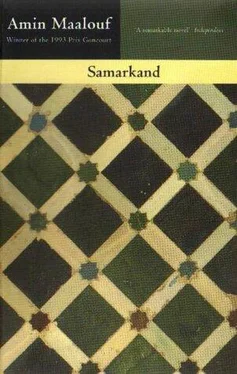That was all absolutely wasted. Grandfather was waiting for me at Cherbourg. I can still see him, on the quai de Caligny, straighter than his cane with his perfumed moustache, his lively gait and his top hat tipping automatically when a lady passed by. When we were seated in the Admiralty restaurant, he took me firmly by the arm. ‘My friend,’ he said, deliberately theatrical, ‘a young man has just been reborn in me, and he needs a companion.’
I was wrong to take his words lightly. Our time there was a whirl. We would hardly have finished eating at the Brébant, at Foyot or at Chez le Père Lathuile before we would have to run to the Cigale where Eugénie Buffet was appearing, to the Mirliton where Aristide Bruant reigned or to the Scala where Yvette Guilbert would sing les Vierges, le Foetus and le Fiacre . We were two brothers, one with a white moustache, the other with a brown one. We had the same gait, the same hat and he was the one the women looked at first. With every champagne cork that popped I studied his gestures and his behaviour, and I could not even once find fault with them. He arose with a bound, walked as quickly as I did, his cane being hardly more than an ornament. He wanted to gather every rose of this late spring. I am happy to say that he would live to be ninety-three — another seventeen years, a whole new youth.
One evening he took me to dine at Durand in the place de la Madeleine. In an aisle of the restaurant, around several tables which had been placed together, there was a group of actors, actresses, journalists and politicians whose names grandfather audibly reeled off for me one by one. In the middle of these celebrities there was an empty chair, but soon a man arrived and I realised that the place had been saved for him. He was immediately surrounded and adulated. Every last word of his gave rise to exclamations and laughs. My grandfather stood up and made a sign to me to follow him.
‘Come on, I must present you to my cousin Henri!’
As he said that, he dragged me over to him.
The two cousins greeted each other before returning to me.
‘My American grandson. He wanted to meet you so much!’
I did not hide my surprise too well, and the man looked at me with some scepticism before stating:
‘Let him come and see me tomorrow morning, after I have had my tricycle ride.’
It was only upon sitting back at my table that I realised to whom I had been presented. My grandfather was very eager for me to know him, and had spoken of him often with an irritating pride of clan.
It is true that the aforementioned cousin, who was little known on my side of the Atlantic, was more famous in France than Sarah Bernhardt, as he was Victor-Henri de Rochefort-Luçay, now known in democratic France as Henri Rochefort, a marquis and a communard, former deputy, minister and convict. He had been deported to New Caledonia by the regular troops. In 1874 he effected a swashbuckling escape which inflamed his contemporaries’ imagination, and which Eduard Manet depicted in his painting The Flight of Rochefort . However, in 1889 he was sent off into exile again for having plotted against the Republic with General Boulanger, and it was from London that he managed his influential newspaper l ’ Intransigeant . Returning in 1895 thanks to an amnesty, he had been welcomed back by two hundred thousand delirious Parisians — both Blanquistes and Boulangistes , revolutionaries of the left and the right, idealists and demagogues. He had been made the spokesman of a hundred different and contradictory causes. I knew all of that, but I was unaware of the most important thing.
On the appointed day I went off to his residence on rue Pergolèse, incapable of imagining at the time that this visit to my grandfather’s favourite cousin would be the first step of my never-ending trip in the universe of the Orient.
‘So,’ he said accosting me, ‘you are sweet Geneviève’s son. Are you not the one to whom she gave the name of Omar?’
‘Yes. Benjamin Omar.’
‘Do you know that I have held you in my arms?’
As this was the case, he was now obliged to address me familiarly. The same, however, did not apply to me when addressing him.
‘My mother has actually told me that after your escape you landed at San Francisco and took the train for the East coast. We went to New York to meet you at the station. I was two.’
‘I remember perfectly. We spoke of you, of Khayyam and of Persia and I even predicted that you would be a great orientalist.’
I shammed a little embarrassment in admitting to him that I had side-stepped his vision and that my interests were elsewhere — I was more oriented toward financial studies, foreseeing myself one day taking over the maritime construction business started by my father. Appearing to be sincerely disappointed by my choice, Rochefort set off on a lengthy plea, intermixed with the Persian Letters of Montesquieu and his famous ‘How can one be Persian?’, the adventure of the gambling-addict Marie Petit who had been received by the Shah of Persia by passing herself off as Louis XIV’s ambassador, and the story of Jean-Jacques Rousseau’s cousin who ended his days as a watchmaker in Isfahan. I was only listening to the half of it. Above all I was watching him, with his voluminous and immoderate head, his protruding forehead topped by a tuft of thick wavy hair. He spoke with passion, but without emphasis and without the gesticulations which one might have expected from him having read his intense writings.
‘I am mad about Persia, although I have never set foot there,’ Rochefort declared. ‘I do not have the soul of a traveller. Had I not been banished or deported those few times I should never have left France. But times change, and the events which are taking place at the other end of the planet are affecting our lives. If I were twenty today, instead of being sixty, I should have been very tempted by an adventure in the Orient — particularly if I were called Omar!’
I felt constraint to justify my lack of interest in Khayyam. In order to do so, I had to mention the dubious nature of the Rubaiyaat , the absence of a copy which could prove their authenticity once and for all. For all that, as I was speaking, an intense glimmer came into his eyes, an exuberance which I failed to understand. Nothing in my words was supposed to provoke such excitement. Intrigued and irritated, I ended up compressing what I had to say and then falling silent quite abruptly. Rochefort questioned me enthusiastically:
‘If you were certain that such a manuscript existed, would your interest in Omar Khayyam be reborn?’
‘Naturally,’ I admitted.
‘And if I were to tell you that I have seen this manuscript of Khayyam with my own eyes, in Paris what’s more, and that I have leafed through it?’
To say that this revelation immediately turned my life upside down would be inexact. I do not believe that I reacted the way Rochefort had presumed I would. I was both abundantly surprised and intrigued, but I was still sceptical. The man did not inspire me with unlimited confidence. How could he know that the manuscript he had leafed through was the authentic work of Khayyam? He did not know Persian and the wool might have been pulled over his eyes. For what incongruous reason would this book have been in Paris without a single orientalist reporting the fact? I did no more than utter a polite but sincere ‘Incredible!’, since it showed both the enthusiasm of the man I was speaking to and my own doubts for I was not yet ready to believe in it.
Rochefort went on:
‘I had the chance to meet an extraordinary personality, one of those beings who cross History determined to leave their imprint on the generations to come. The Sultan of Turkey fears and courts him, the Shah of Persia trembles at the mere mention of his name. He is a descendant of Muhammad, but was nonetheless chased out of Constantinople for having said, at a public conference in the presence of the greatest religious dignitaries, that the profession of the philosopher was as indispensable to humanity as that of the prophet. He is called Jamaladin. Have you heard of him?’
Читать дальше












